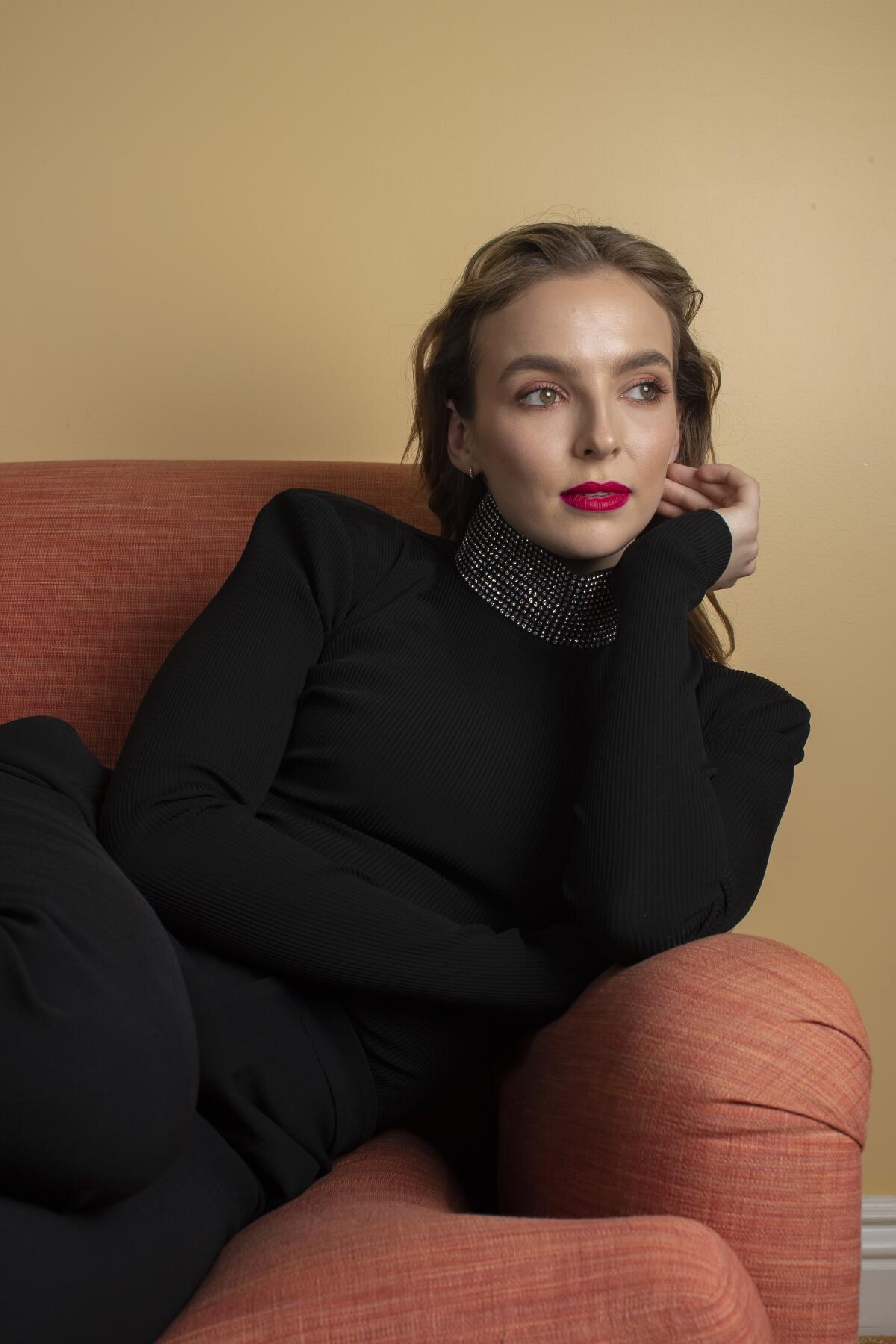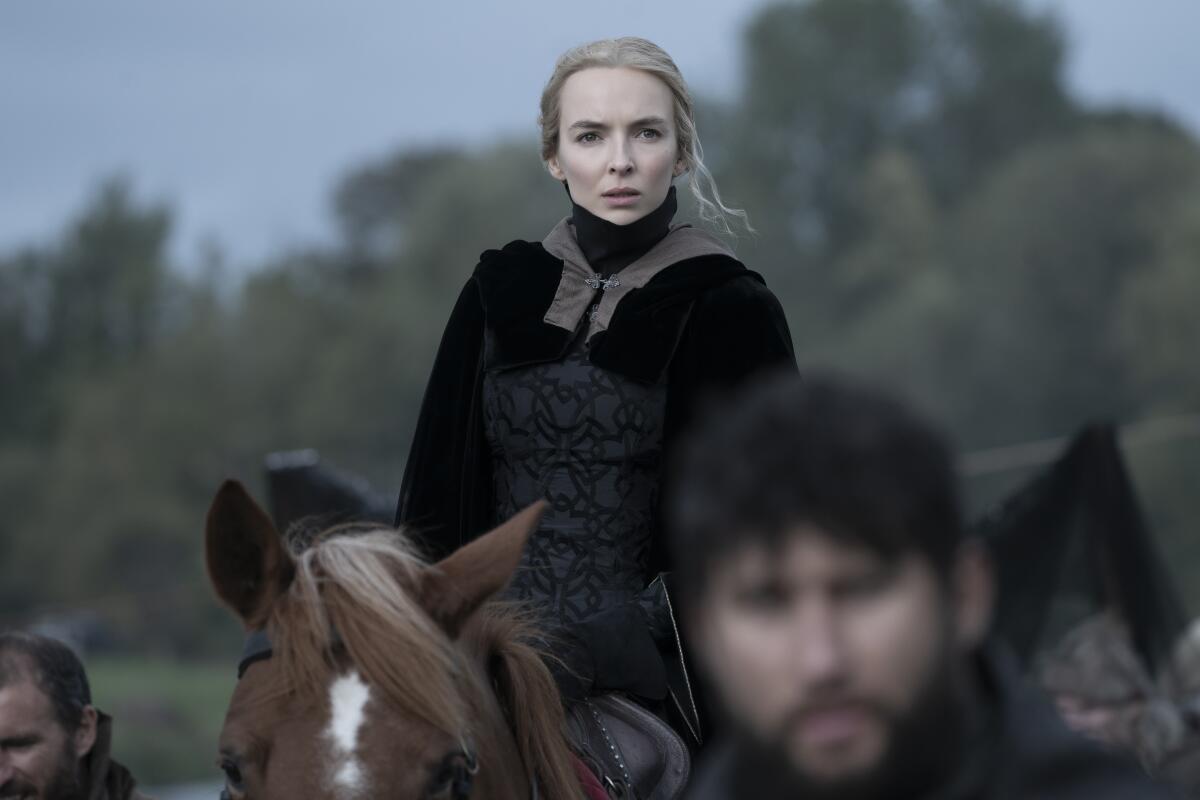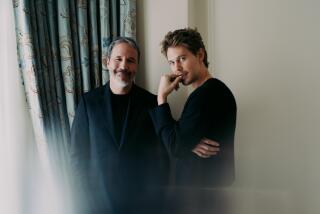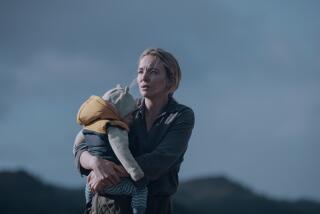Jodie Comer gives voice and strength to her 14th century rape victim in ‘The Last Duel’

- Share via
Jodie Comer is killing it, as they say. An Emmy winner for her ruthless (though not humorless) assassin Villanelle on “Killing Eve” (heading into its fourth and final season), she’s now starring in Ridley Scott’s “The Last Duel” as the real-life Marguerite de Carrouges, a 14th century woman who seeks justice after a rape. And in each role she plays, the Liverpool-born Comer, 28, is deft with her preternatural ability to elicit sympathy — but not pity — for her damaged but still defiant characters. That said, “Duel” provides a challenging role to play — and to watch. Comer dug into the nitty-gritty of why it spoke to her with The Envelope.
“The Last Duel” has a “Rashomon” structure to it; we see several scenes, including the critical rape scene, from multiple points of view. Was that structure part of what appealed to you?
Definitely. I thought it was an interesting exploration; I also thought it was kind of dangerous, in a way. I was very clear that Marguerite was always telling the truth, and I was intrigued to delve into these other perspectives and hopefully provoke thought among the audience, just making them all think about how we experience things very differently.
We see Marguerite’s point of view last, and the title card ahead of it is clear that this is the truth of what happened, not just her perspective. Would you not have signed on if that emphasis had been ambiguous?
Definitely not. To see that everyone really wanted to give her an opportunity to have a voice and tell it this way was a huge draw for me.
You had to enact the attack twice, and one of them was as Marguerite’s rapist saw things. Which came first, and how was it emotionally different for you the second time around?
We did Marguerite’s version first, which I was grateful for. It was like, let’s get that done and we pull back from there. We established her truth. Then when we’ve established her story, I had to evaluate what we found and say, “In this moment, I’m clearly saying no and I’m retreating. How do I make that look like an invitation?” Because the dialogue was the same. It was like, how do I use this dialogue and the same movement but make him somehow believe that even though I’m saying “no,” I’m actually saying “yes.” Ridley shoots with four or five cameras at any given moment, so I think we did two takes of each version. And we were off set by lunchtime, which is unheard-of.

Scott has spiked his career with female characters who are not necessarily superheroes, but they often are survivors in charge of their own fates. Is that partly why you wanted to work with him?
I’ve been lucky to see firsthand what it’s like being on the set with him. Every beat, there’s motivation behind the choices he makes. It was really important that this woman was fully formed and that she had this experience but wasn’t defined by it. It’s true — a lot of the women in his films are like superheroes but without the capes. There’s a resilience and power and sense of control that they have over their own narratives.
Why do we need another film about a woman who’s sexually assaulted? What does this contribute that elevates or evolves the conversation?
For me, it was an opportunity to give her a voice. As long as it was told in a way that is respectful, it isn’t gratuitous. It isn’t serving the male gaze. These stories are hugely important because they hold a mirror up to us as a society. Sometimes you have to think, “Wow, we really haven’t gone that far.” To see a woman abused on screen isn’t easy, and it can be triggering for many people. That’s why I believe it needs to be in the right hands and done for the right reasons. When there is an opportunity to say something and make us look at ourselves and evaluate — it may make you feel awful, but it is provoking emotions. That’s what I always want to do with my work.
You’re signed up to shoot “Kitbag” with Scott, where you play Napoleon’s wife, Josephine. There’s a famous real-life exchange between those two in which Napoleon urges her not to bathe before he comes home. So will you get that deep into character?
(Laughs) Well, there’s a question. For the sake of everyone else on set, no!
More to Read
From the Oscars to the Emmys.
Get the Envelope newsletter for exclusive awards season coverage, behind-the-scenes stories from the Envelope podcast and columnist Glenn Whipp’s must-read analysis.
You may occasionally receive promotional content from the Los Angeles Times.










